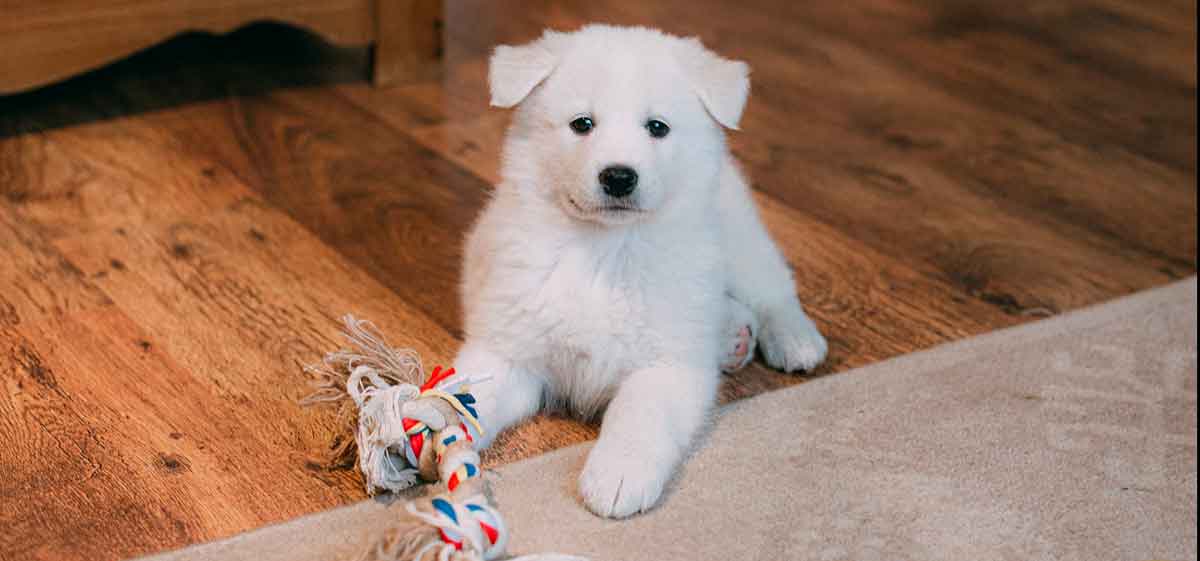Puppies are playful and curious creatures.
They have so much to learn and experience, so they often behave in ways they should not.
This includes biting and chewing on things just for fun.
At first, it might seem cute, but the longer it goes on, the more you will want to learn how to handle puppy biting and nipping.
Puppy Teething Vs. Nipping And Biting
Puppies start with about 28 small teeth in their mouths.
As they grow up, they eventually lose their baby teeth and grow adult teeth just like humans do.
When a dog is an adult, they should have a set of 40 full-grown teeth.
Growing new teeth can be painful for a puppy.
They might chew or gnaw on things to help them feel better.
However, puppies will also nip or bite for other reasons too.
Oftentimes, nipping is a way that puppies play, especially with other dogs.
If this gentle nipping is not controlled early on, it could eventually turn into painful bites.
It’s best to take control of your puppy’s nipping behavior early on.
It’s typically easy to tell the difference between gnawing and biting.
When a puppy gnaws, they will usually nibble on an object or on your fingers.
When a puppy nips or bites, it will often be sudden or accompanied by other excited behaviors.
Both of these habits can quickly get out of hand without proper training.
4 Tips On How To Handle Puppy Biting
Teaching your puppy not to bite is one of the essential parts of training.
Some puppies might be teething while others just like to nip for fun.
There are a lot of things to consider when it comes to learning how to stop puppy biting.
Stopping your puppy from biting might seem challenging, but with enough patience and consistency, you can teach them to stop their bad habits.
Show Pain When A Bite Is Too Hard
Dogs can’t speak like humans, so they use body language and sounds to communicate with you and with other dogs.
If your puppy is biting too hard, it would be obvious.
For example, if they seem like they are play-biting with another dog, you will know it’s too much if the other dog suddenly yelps.
If they get too rough with you, you will feel pain as a result.
Play bites should be harmless, so they shouldn’t inflict any type of pain or discomfort on anyone else.
You need to find a way to let your puppy know when they are biting too hard.
You need to let your puppy know how to restrain themselves.
Most people’s gut reaction is to yell at their puppy and quickly pull their hand away when they get bit, but this is not beneficial for your dog.
In fact, pulling your hand away will only trigger them to chase it or they will sense that maybe you are playing.
In order to properly teach your dog, you need to think like a dog.
When your puppy bites you too hard, you should make a yelp sound or say “ow” to let them know that you are hurt.
Additionally, you should let your hand go limp instead of pulling it away.
This helps your puppy understand that the game is over and that they should stop being so rough.
If you do those actions three times in a row, but your puppy still doesn’t listen, you should end their playtime for now and give them a “time out”.
If they let go when you sound like you are in pain, you should praise them.
By doing this for only bites that hurt, they should eventually be able to distinguish a play bite from a painful one.
Redirect Your Puppy Before They Can Bite
Some dog parents prefer it if their puppy doesn’t nip at all, and that’s perfectly fine.
If that’s the case, then the next effective approach is to redirect your puppy toward good behaviors.
This means that if your puppy leans in like they are about to bite you, you should move your hand away before contact.
Then, encourage them to chew on a treat, toy, or bone instead.
If you notice your dog getting ready to pounce or jump at you, this is a sign that they are about to nip or bite.
As soon as you spot these behaviors, you should redirect them with some type of toy.
Your puppy might still want to nibble on your fingers while playing from time to time, and if that’s the case, you should choose a game that doesn’t involve contact with your hands.
Fetch or tug-of-war are great games for puppies because it allows them to have something in their mouth without hurting anyone else.
If they grip onto their toys too aggressively, you might want to teach them the “let go” command to prevent them from hurting anyone in the future.
Some puppies just won’t cooperate even if you have tried to redirect them multiple times.
This might be a sign that they have too much energy.
An energetic pup is much less likely to sit still and obey you than a relaxed puppy is.
Take your puppy for a walk or let them run around the yard for a while.
Then, come back and revisit the training after they have calmed down.

Distract Your Puppy
If your puppy is chewing on things other than just your hand, you will need to find a way to distract them from it.
Most of the time, puppies chew on random objects out of curiosity or boredom.
It’s important for you to make sure they are only chewing on things that they are supposed to.
You should have plenty of durable toys ready for your puppy.
If they try to chew on something they shouldn’t, distract them with a toy.
For smaller puppies, plush toys are fine, but if your puppy shreds their new toys within days, you might want to choose something tougher.
Toys made of rubber or hard plastic usually last much longer.
The best toys to keep your dog distracted are mental stimulation toys.
These are toys that have a hidden treat inside or peanut butter smeared in the crevices.
These toys are much more interesting for dogs of all ages because it gives them a goal.
They want to get the object out of the toy, so before long, they will forget all about biting or chewing on objects they should not be.
Deter Your Puppy
Distractions won’t always work for your dog.
If all else fails, you will need to find a way to steer your dog away from what they are nibbling on.
Find something that has an unpleasant taste, such as a bitter apple or a special no-chew spray.
By spraying the object, it should deter them from chewing on it.
No-chew sprays work, but only by using them for a period of time.
Eventually your puppy will forget that object and move on to other more interesting things, hopefully an approved dog chew toy.
How To Deal With Puppy Aggression
Sometimes, chewing and nipping has a lot more to do with aggression than teething.
A puppy might bite out fear or frustration rather than playfulness or curiosity.
If those aggressive behaviors occur, you will need to start training them more seriously.
Puppies that show aggression will likely throw “temper tantrums”.
This means that your puppy might suddenly start acting upset with you.
Their body could tense up and they might even snarl or growl.
If they bite you during this situation, it will hurt significantly more than a playful bite.
Usually, puppies will do this when you are doing something they don’t like, such as handling them too much.
When you react to puppy aggression, it should be different than your approach to playful puppy biting.
If you yelp or say ‘ow’, that might only anger your dog more.
Instead, you should try to remain calm.
Don’t yell at your puppy or scold them because that will only upset them.
The best thing to do is remain neutral in the situation to help your puppy calm down too.
Once you are calm, hold your puppy firmly, but be careful not to hurt them.
They will likely struggle a little at first, but give them some time to relax.
Eventually, they should quiet down and stop being angry at you.
Once they have been calm for a couple of moments, you can release them.
This should work fine for a one-time moment of anger, but if your puppy repeatedly shows aggression, it’s not something that can easily be fixed.
If you suspect that your puppy is acting overly aggressive early on, it’s a good idea to enroll them in puppy classes.
These classes can help teach your puppy basic manners and allow them to socialize with other dogs.
Sometimes, dogs are aggressive simply because they don’t properly interact with other dogs or people often enough.
Puppies will not simply grow out of aggressive behaviors.
If your dog’s behaviors worsen as they get older, you should seek professional help as soon as possible, such as a dog trainer.
A trainer can assess your puppy’s behaviors and let you know if your puppy’s actions are normal parts of teething or if they are related to a more serious issue.
If you don’t get your dog the help they need, it will be more difficult to train them and control them as they grow up.
Benefits Of Chew Toys For Puppies
Chew toys are one of the most important parts of teaching your puppy not to bite.
If your dog has plenty of items to gnaw on, then it’s less likely that they will cause destruction to valuable items.
When you anticipate that your puppy is about to bite, quickly give them a chew toy as a substitute.
Not only do chew toys stop your puppy from hurting others and destroying objects, but they can also provide other benefits for your pup along the way.
First of all, chew toys are the key to helping your dog with teething.
Teething pain is one of the most uncomfortable things for a pup, so chewing on a toy can help their aching gums feel better.
It will distract them from many of the destructive behaviors that come with teething.
Chew toys also keep them entertained.
Oftentimes, puppies will chew your belongings because they are bored.
Chewing provides entertainment for a young puppy, so if they don’t have toys to keep them busy, they will need to go elsewhere to find that entertainment.
If you can find a toy that’s nearly indestructible, your puppy will have endless playtime with it.
Even if your puppy’s favorite chew toy lasts a long time, you should still have plenty of other toys as backups.
As entertaining as toys are, puppies can only focus on one item for so long.
You will need to have more toys ready to ensure that your dog always has something new to chew on.
Finally, chew toys can also benefit your dog’s dental health.
Chewing on a toy scrapes plaque off your dog’s teeth, cleaning them as they go.
Some chew toys are specifically made to clean your dog’s teeth, and they usually have a taste that’s interesting for your pup.
Final Thoughts
Learning how to stop puppy biting can be frustrating.
Puppies are curious and get distracted easily, so they might not listen to you all the time.
If you keep your training consistent and if you stay patient with your pup, they will eventually learn from you.
When in doubt, use chew toys as distractions from harmful chewing.
Never give up because training is a key part of bonding with your puppy and helping them grow into a mature adult dog.

